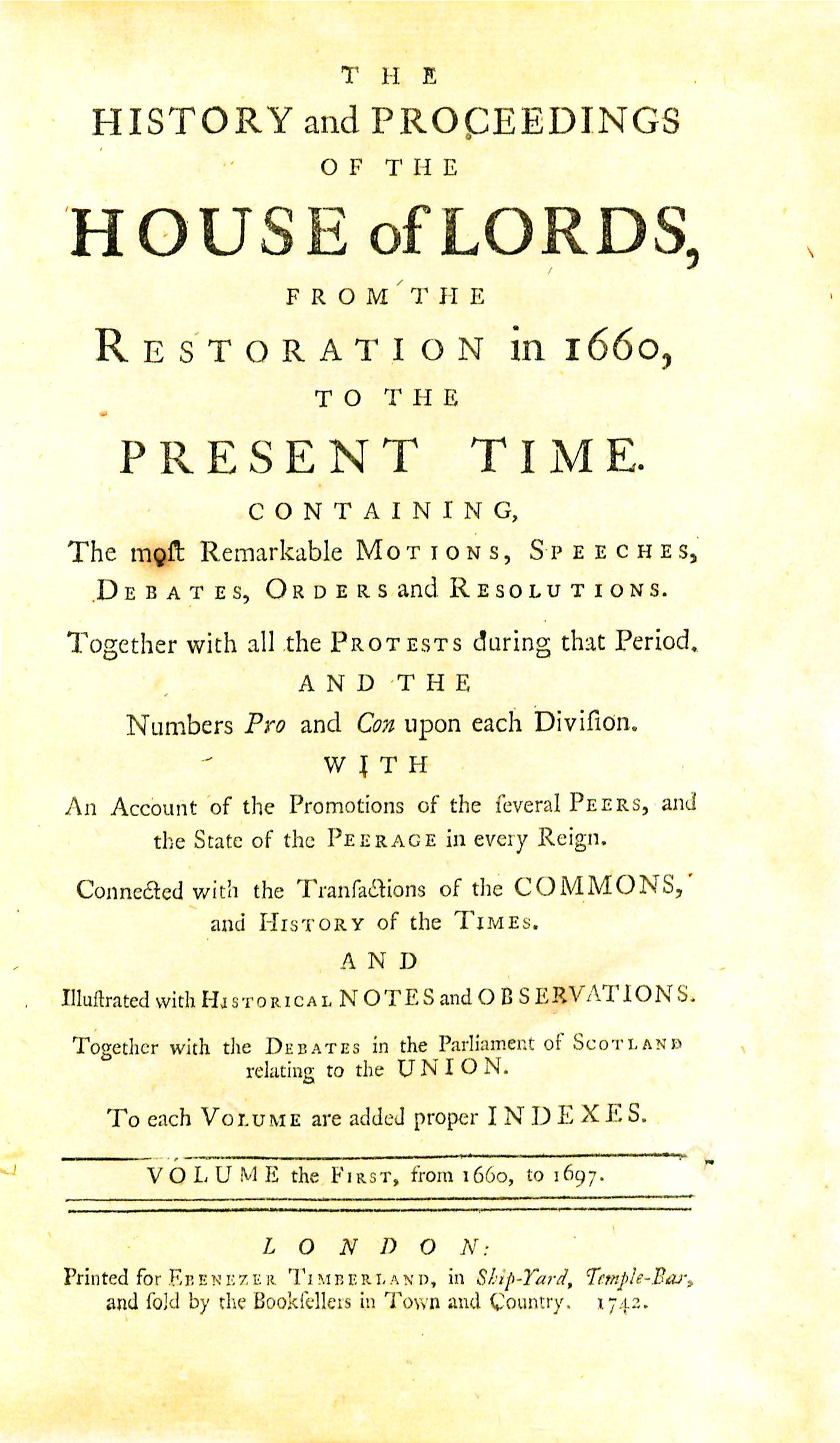The History And Proceedings Of The House Of Lords
The History and Proceedings of the House of Lords, from the Restoration in 1660, to the Present Time, Containing the Most Remarkable Motions, Speeches, Debates, Orders and Resolutions. ... and Illustrated with Historical Notes and Observations. Together with the Debates in the Parliament of Scotland Relating to the Union
by Great Britain. Parliament. House of Lords.
| Timberland's Debates | |
|
Title page from The History and Proceedings of the House of Lords, volume one, George Wythe Collection, Wolf Law Library, College of William & Mary. | |
| Author | Great Britain. Parliament. House of Lords. |
| Published | London: Printed for Ebenezer Timberland, in Ship-Yard, Temple-Bar |
| Date | 1742-1743 |
| Language | English |
| Volumes | 8 volume set |
| Desc. | 21 cm. |
The History and Proceedings of the House of Lords, from the Restoration in 1660, to the Present Time was published in eight volumes by Ebenezer Timberland from 1742 to 1743.[1] It is often referred to as Timberland’s Debates, or, along with its companion, Richard Chandler’s History and Proceedings of the House of Commons from the Restoration to the Present Time, as Chandler and Timberland’s Debates.[2] In 1806, William Cobbett published his Parliamentary History of England from the Earliest Period to 1803, which superseded all previous collections of the speeches and debates of Parliament.[3] Cobbett’s intention was to eliminate the problems faced by readers of the earlier collections. [4] He found that these volumes were full of extraneous material and lacked a propeTory and Whig.</ref> They were based on the reports of Parliamentary proceedings published in monthly magazines, which tended to focus only on the most controversial debates, and which were adapted from the notes of observers in the galleries rather than from official transcripts.[5] Despite these shortcomings, Chandler and Timberland’s Debates remained one of the major sources of knowledge of the proceedings of Parliament, especially before Cobbett’s publication. Even after 1806, serious students of English history would still need to be familiar with these collections.[6]
Evidence for Inclusion in Wythe's Library
Listed in the Jefferson Inventory of Wythe's Library as Debates in the H. of Lords 7.v. 8vo. and given by Thomas Jefferson to his son-in-law, Thomas Mann Randolph. It later appeared on Randolph's 1832 estate inventory as "'Debates of Parliament' (19 vols., $20.50 value)." Both Brown's Bibliography[7] and George Wythe's Library[8] on LibraryThing include The History and Proceedings of the House of Lords.
Description of the Wolf Law Library's copy
Bound in full calf with 5 raised bands, brown leather labels and gilt decoration on the spine. Has marbled endpapers and the printed bookplates of George Farmer, Earl of Pomfret in all volumes. Purchased from Titles, Inc.
View this book in William & Mary's online catalog.
External Links
References
- ↑ Tory and Whig: The Parliamentary Papers of Edward Harley, Third Earl of Oxford, and William Hay, Stephen Taylor and Clyve Jones, eds. (Woodbridge, Suffolk: Boydell & Brewer, Ltd., 1998), 15.
- ↑ Ibid.
- ↑ Guy Carleton Lee, Leading Documents of English History: Together with Illustrative Material from Contemporary Writers and a Bibliography of Sources (London: George Bell and Sons, 1900), 12-13.
- ↑ William Cobbett, preface to The Parliamentary History of England from the Earliest Period to the Year 1803, from which Last-mentioned Epoch it is Continued Downwards in the Work Entitled “Hansard’s Parliamentary Debates" (London: T.C. Hansard, 1806), unpaginated.
- ↑ Ibid.
- ↑ Lee, Leading Documents of English History.
- ↑ Bennie Brown, "The Library of George Wythe of Williamsburg and Richmond," (unpublished manuscript, May, 2012) Microsoft Word file. Earlier edition available at: https://digitalarchive.wm.edu/handle/10288/13433
- ↑ LibraryThing, s. v. "Member: George Wythe," accessed on June 28, 2013, http://www.librarything.com/profile/GeorgeWythe
